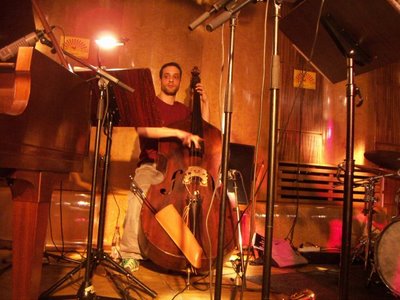Anthony Braxton Quartet@PP Café, 26/11/2006

Anthony Braxton - as, ss
Alessandro Giacero - p
Antonio Borghini - b
Cristian Calcagnile - d
We are now cruising at 3,000 metres.
Every time, I was on a knife-edge between liking the heads and loathing them (debate rages in the comments). When Braxton played inside the chords or let diminuendos linger on, it was as if he were having a kind of conversation with traditional notions of beauty. He was obviously keenly aware of them and how to produce them. If the point of playing standards is generally to make the listener feel at ease, then Braxton's refusal to provide a comfort zone was jarring but interesting: he'd go from powerful improvising and a delicate theme reprise to yet another hesitant head. After the very first notes of the second set, my agitated neighbour exclaimed "Toujours aussi faux!" ("As out-of-tune as ever!"), while enjoying the music as a whole immensely. By that measure at least, Braxton's approach was a success.
The discomfort issue was heightened by Braxton's body language. While playing, he was generally bent over at an odd 45-degree angle, the advantage of which was to allow hilarious Jarrettian butt wiggling. The naming of the musicians, read from the sheet pictured above at the end of each set, became a running joke, as he faltered every time. It was as if he considered the hyphens in "Jack-Kher-Ro" to be equal members of the name. When he actually managed to pronounce Calcagnile at the end of the first set, the drummer threw up his arms in Rocky-like triumph. Some may compare Braxton's Italian name reading to his standards head reading.

Opinions were divided as to whether the drummer was any good (the harshest critics thought little of the whole run). By the fourth concert, I found myself thinking that the less he played, the better the band sounded. The times he really stayed in the pocket for a while were great, because otherwise he tended to get very loud and busy, very fast. The quiet fill wasn't really his thing. When he peppered a quiet stretch with insanely loud exclamation marks and I couldn't help but wonder if he was self-parodying. Also, Calcagnile wasn't a polyrhythmic player at all, so some of the free sections sounded a bit shallow.
Alessandro Giacero evolved too, thankfully easing up on the kind of long, florid and complex contemporary jazz lines that don't seem to have any real beginning or ending. One of his solos was a beautiful little thing, made up of short, singing phrases directly derived from the tune's melody and with a real shape to them. And of course there were the hi-NRG moments and the floating, mysterious ones.
There's no need to restate my love of Antonio Borghini's exploratory-yet-soulful playing.

It's been fascinating watching this pick-up band (assembled by Braxton's Italian manager) become a unit. At this stage, there were discoveries major and minor to be made. A minor one occurred when Braxton and Giacero engaged in imitative dialogue. The highlight of the evening came when Alessandro Jack-Kher-Ro led the rhythm section by playing the melody over and over again while damping the strings with his left hand. The effect was a combination of harpsichord and honky tonk, and the bassist and drummer responded in kind by laying down a clattering 2-beat. It was reminiscent of Dave Burrell or Air unceremoniously shunting old-timey jazz into the future.
During Braxton's solos, he would often take his time reaching a skronking climax, which served as the starting point from which the rhythm section would work its way back to the song, sometimes in surprising ways.
The few out-and-out ballads they played over the four nights were especially dicey, but the second set's "It Never Entered My Mind" was nice, in a bizarre way. After the theme and an arco bass-alto saxphone unison passage that conjured up the image of an old lady being helped across the road, the quartet floated off into a distressingly unsettled space that simply ended, without returning to the theme.
Jan (son of Frederic) Rzewski was invited to sit in on one piece on soprano and completely changed the band's dynamic. The centre of gravity naturally shifted towards the front line, which engaged in quiet dialogue interspersed with long "Quartet pour la fin du temps"-style crescendos, while piano and bass provided grounding figures and the drums super-inflated the drama by constantly swooping from loud to soft. This kind of more arid collective improvisation seemed like its own kind of standard.
For the first time, there were two encores, the second of which was a "Monk's Mood" that consisted solely of a couple of minutes of repetitions of the melody.
The four nights were filmed and recorded. There was early talk of a box set, but I think a 78-minute CD, perhaps with a few nips and tucks, would be sufficient. It's not as if there's a lack of Braxton standards albums in the world. A documentary DVD might actually be more interesting, as rehearsals and interviews were also taped.



|